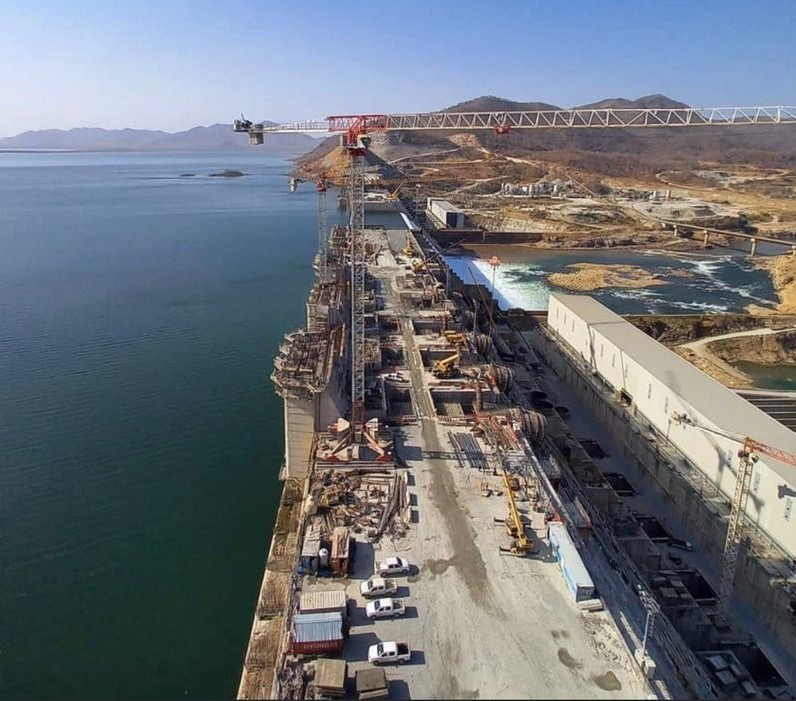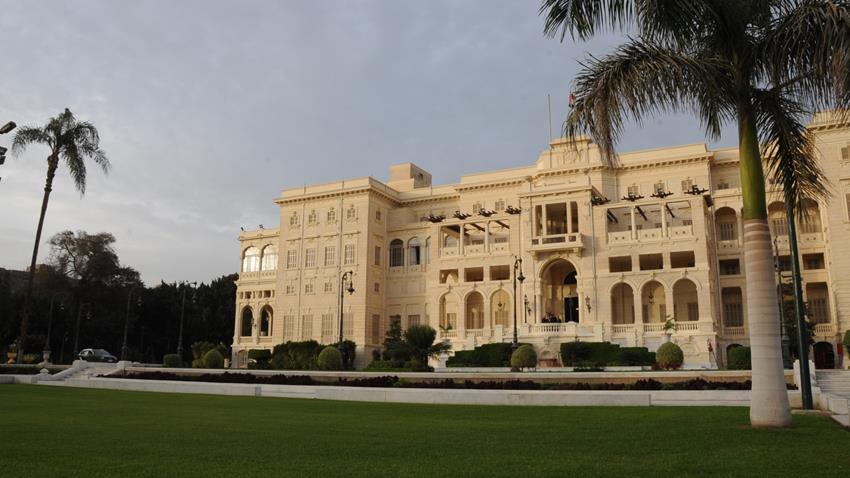
Mohamed Sultan, head of the ambulance authority, said a total of 48 had been injured in clashes in front of the Ettehadiya Presidential Palace as of 8 pm on Friday night.
The injuries ranged from bruises to suffocation from tear gas fired by security forces.
Seven individuals were transferred to Heliopolis Hospital, and five to Manshyat al-Bakri Hospital, while the rest received first aid on the ground, Sultan said.
The president's office issued a strongly worded statement on the clashes this evening, stating that the protests "began, unfortunately, to go beyond the scope of peaceful [protests as demonstrators] hurled Molotov cocktails, incendiary devices and fireworks, and tried to storm the palace gates and climb its walls."
These “violent anarchist practices” have nothing to do with the principles of the revolution, or any legitimate political practices supporting freedom of expression, the statement continued.
All political forces in any way involved in encouraging these events bear full responsibility for today's clashes, and investigations into the violence will seek them out, the president's office warned.
The statement went on to declare that all political forces must condemn these non-peaceful protest strategies and immediately demand that their supporters leave the vicinity of the palace, warning that security forces would do whatever it takes to protect state institutions.
Clashes ignited between protesters and security forces late Friday afternoon. After the Interior Ministry deployed five Central Security Forces armored vehicles to the scene in an attempt to bring the situation under control, security forces pushed protesters away from the presidential palace and into the side streets as they continued firing a barrage of tear gas into the crowd.
CSF forces then reportedly torched the makeshift tents set up by protesters holding a sit-in around the palace.
Major General Mohamed Zaki, the commander of the republican guard, pleaded with the demonstrators to protest peacefully, denouncing what he called attempts to storm the palace.
Earlier in the evening Al-Jazeera Mubasher Misr showed protesters hurling fireworks over the walls of the palace, which the state-TV website referred to as "fire balls." Security forces retaliated by shooting teargas into the crowd.
Some protesters also reportedly hurled Molotov cocktails at Gate 4 of the palace, setting it ablaze. The republic guards retaliated by shooting water cannons and tear gas, while other security forces attempted to put out the blaze. All security forces withdrew inside the palace when the clashes broke out.
The clashes began after a group of protesters moved the crowd control barriers set up by security forces in front of Gate 4. The republican guards securing the palace began fighting with the protesters, attempting to stop them from removing the barricades and urging them to protest peacefully. Dozens of Black Bloc protesters arrived on the scene, chanting, "Down with the supreme guide's rule."
Other protesters formed a human chain around barbed wire fencing to prevent their fellow demonstrators from removing it and sparking clashes.
Thousands of protesters gathered in front of the palace in the early afternoon, chanting, "The people want to bring down the regime," and "Wake up [President Mohamed] Morsy, today is your last day."
As marches from Rabaa al-Adaweya and Nour Mosques arrived at the palace earlier in the day, protesters chanted, "Bread, freedom, social justice" and raised flags for various opposition parties. Protesters holding a sit-in at the palace received the marches by chanting, "Peaceful, peaceful," and "Welcome, revolutionaries; welcome, free men."
Demonstrators set up a stage at the entrance to Merghany Street. A speaker took to the stage to remind those gathered that the protests would be peaceful, stating, "Today we will demand the rights of the martyrs, and our goal is to overthrow Morsy, but not through clashes with the CSF [Central Security Forces]."
Protesters blocked part of Merghany Street with iron barricades and tires. The police tried to negotiate with them to reopen the street, but they refused.
Security forces intensified their presence at Gate 4, and street vendors spread around the area.
Hundreds of activists had marched from Nour Mosque in Abbasseya to Heliopolis after Friday prayers, demanding the fall of Morsy's regime.
Protesters included members of the April 6 Democratic Front, the Popular Current and the Revolutionary Socialists. They chanted, "The people want to bring down the regime," "It is serious this time, we won't leave it to anyone," "Down with the supreme guide rule," and "The people want to bring down the Brotherhood's prosecutor general."
They raised April 6 and Revolutionary Socialist flags, and held up posters with the images of martyrs, including Al-Husseini Abu Deif, a photojournalist for Al-Fagr who was shot dead during protests in front of the palace in December.
Some demonstrators carried posters with photographs of former President Gamal Abdel Nasser, and banners reading, "Continue your revolution for freedom."
Black Bloc protesters were present in the march. The Black Bloc is a previously unknown group of protesters who emerged during demonstrations marking the second anniversary of the 25 January revolution, and who wear black masks and outfits. The prosecution has ordered the arrest of anyone in Black Bloc gear.
National Salvation Front leader and Constitution Party head Mohamed ElBaradei said that the goals of the revolution should be achieved using the same peaceful methods that brought down former President Hosni Mubarak.
"We brought down Mubarak's regime in a peaceful revolution, and we insist to achieve its objectives in the same way, no matter what the sacrifices are or the brutal methods of repression, " he wrote Friday on Twitter.
"Our strength is in our unity, our numbers and peacefulness," he added.
The march from Abbasseya followed another march to the presidential palace that left from Rabaa al-Adaweya Mosque in Nasr City shortly after Friday prayers. Hundreds of protesters raised the Egyptian flag and flag of the Communist Party, chanting “Down with the supreme guide’s rule,” referring to the Muslim Brotherhood leader Mohamed Badie.
Dozens of protesters began gathering in front of the palace early in the morning in anticipation of the arrival of the marches. They raised banners with images of Nasser that read, "Abdel Nasser said it a long time ago: Brothers should not be trusted." Other signs read, "Hamas, Brothers, Qatar, America are the enemies of the Egyptian people," and "Rescue Egypt from the supreme guide's rule."
On Merghany Street, demonstrators hung up signs and banners criticizing the Brotherhood. Protesters who have been staging a sit-in there hung signs on their tents reading, "No America, No Brothers."
Protesters held an early morning meeting where they agreed to fight for one demand — to overthrow the regime and call for Morsy to step down, in order to make room for new leaders who could achieve justice for the martyrs of the revolution.
A stage was built with large speakers. Some protesters moved the barbed wire blocking part of the street to make way for the anticipated marches.
Opposition forces called for massive protests and marches against Morsy and the Muslim Brotherhood across the country today, accusing them of using Mubarak's brutal methods of oppressing protesters. They demand a new Constitution based on national consensus, and an end to Brotherhood domination of the state.
They are also protesting against the state of emergency declared by Morsy in Port Said, Suez and Ismailia. The president made the move as increasingly violent clashes between protesters and police swept through the nation following demonstrations marking the anniversary of the 25 January revolution. At least 53 have been killed and nearly 2,000 injured in the clashes over the past week.
Eighteen movements and political parties have announced they would take part in today's protests, including the Popular Current, Constitution Party, Kefaya Movement, April 6 Youth Movement, Karama Party, the Social Democratic Party and the Revolutionary Socialists.
"For over six days, Morsy and the Muslim Brotherhood's regime continue shed the blood of Egyptians in the streets … The authority reproduced the same repressive security practices of the past to bury the anger of the Egyptian people toward Morsy's policies over the past six months. [The Muslim Brotherhood] attempted to abort the revolution and its objectives by enabling one party to control the state and its institutions, and not changing the economic and social policies," participating forces wrote in a statement Thursday night.
Security forces also began preparing for today's marches. Central Security Forces troops were deployed in high numbers, as well as dozens of armored vehicles and CSF trucks. Troops set up barbed wire and iron barricades at Gate 3 and Gate 4 of the palace.
"We all recognize that the security system needs to be developed, and we all strive to build such a system. The minister of interior stepped into his job in circumstances that I excuse him for, though I never supported an interior minister before … The police are dealing with [protests] in a restrained way and must be thanked," said Ayman Ali, the president's adviser on expatriate affairs.
In an interview with Al-Jazeera Mubasher Misr on Thursday evening, Ali said, "We received a homeland rundown with tons of problems."
He added that demonstrators who stage protests demanding "to bring down the rule of the supreme guide" represent only one view point. He called on people to consider the concerns of average citizens.
Edited translation from Al-Masry Al-Youm




